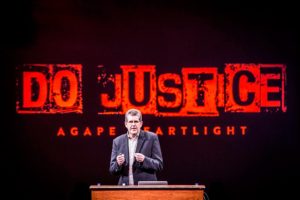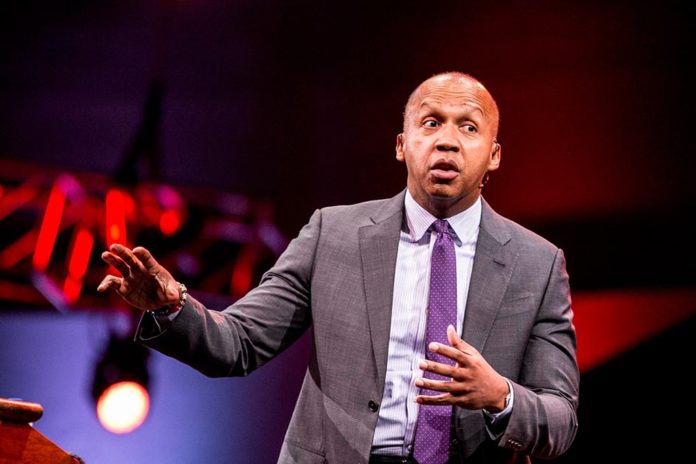by Joyce Kyles
Encouraged. Inspired. Heartfelt. Conviction. These are just a few of the words attendees used to describe this year’s Agape Heartlight event last Friday at Hope Presbyterian Church.
“Do Justice” was the theme of the event, which had two featured speakers – Brian Fikkert, a professor and the founder and president of the Chalmers Center for Economic Development at Covenant College, and Bryan Stevenson, the founder and executive director of the Equal Justice Initiative, based in Montgomery, Ala.
Stevenson, an attorney and social justice activist, spoke boldly and passionately about his personal and professional experiences regarding faith and what it means to do justice, which he said, consisted of four things: being proximate to the excluded, changing the narrative underneath the issues of poverty, staying hopeful and being willing to do uncomfortable things.
Stevenson said sometimes people feel they can’t help those who are hurting until they are ready, but he believes readiness comes when a person is in proximity to the people that need it the most. He challenged the audience to not be afraid to go into the perceived bad parts of town and said there are politicians who don’t give the right advice because they are not in proximity – they’re too far away.
Speaking about the need to change the narrative around race, Stevenson said, “I don’t think we’re free. I think we’re burdened by our history … we live in a post-genocide society.”
Shelby County, he noted, is known for having had the highest number of lynchings in Tennessee. He shared his desire to see markers placed across America where such crimes have occurred, not to punish America, but to liberate its citizens. And, like Fikkert, Stevenson drew upon scripture to emphasize the need for individuals to come out of their sanctuaries and into their purpose of service.
“Your hope is your power,” he said, telling attendees that sometimes it’s easier to be faithful than hopeful, and it takes courage to be hopeful. He closed his speech by reminding attendees that nothing great ever happened without some degree of uncomfortableness and that the opposite of poverty is justice.

Fikkert opened his speech with two questions: “What is poverty? Why did Jesus come to Earth?”
He then directed attention to Nadia, a young woman in her late teens who is addicted to drugs, a prostitute and currently incarcerated. He explained that the way one responds to Nadia reflects the answers to the questions.
When one thinks about poverty, it’s usually in terms of someone poor needing to be given something materialistic, said Fikkert. He was able to demonstrate how the poor tend to define poverty in more psychological and emotional terms.
Speaking later about the root of his passion, Fikkert said, “I always believed very early in life that in order to follow Christ, we must practice grace, mercy and justice. You have to care about the poor. It’s just a matter of following Jesus.”
Fikkert gave a reminder that Jesus was more than a man who came to save sinners – he came to serve. He closed his speech by suggesting that the goal should not be to turn south Memphis into Germantown because both places are fundamentally broken. Instead, it should be to turn both places into the “new” Jerusalem.
Agape Heartlight also featured a brief roundtable discussion with Sharon Griffin of Shelby County Schools, Mauricio Calvo of Latino Memphis, David Jordan, executive director of Agape, and Rufus Smith, senior pastor of Hope Presbyterian Church.
Jordan linked the use of the Do Justice theme to Agape connecting with more than 500 families over the past year to learn what has been working and what hasn’t. Safety, justice, housing and overall stability were named as constant concerns.
“We have to trust the voices of what people say. We cannot eliminate the voices of those in need,” Jordan said. “We have to continue to do the work and ask ourselves, ‘How do we help without hurting?’”
Randy Lillard, vice president of marketing and communications for Agape, said a lot of what Agape does ties into what Dr. King did, with the event designed to be in concert with the essence of the MLK50 commemoration.
For STARS Connector supervisor Angela Garland, Do Justice is “helping parents and children move the needle out of poverty by ensuring children receive a quality education and parents have access to employment and maintain self-sufficiency.”
This event concluded with a call to action.
Joyce Kyles, an Amazon best-selling author, is executive director of Walking Into A New Life, Inc.



